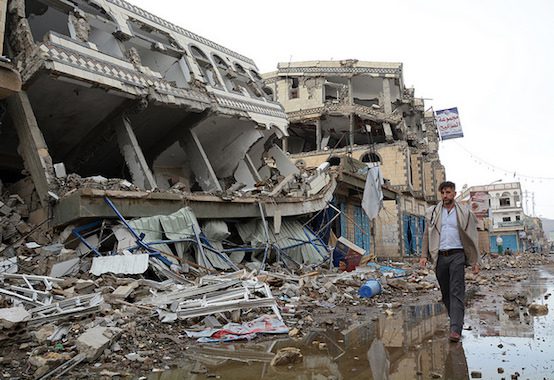Rhodes and the War on Yemen

Sarah Lazare takes Ben Rhodes to task for his past support of the war on Yemen and how he has tried to reinvent himself as a critic of the war since Obama left office:
This is the history of the Yemen War that was handed to Trump, yet Rhodes is hard at work spinning a different, self-serving tale. And in the process, he’s gaining a high profile that’s likely going to position him to serve in—or at least influence—a potential Democratic administration, should that come to pass, and ingratiating himself to Washington, D.C., progressive circles.
This goes beyond Rhodes—and beyond the Obama administration. To prevent another Yemen War, or Iraq War, or bloody Syria intervention, we need to confront the insidious nature of our bipartisan war machine.
U.S. support for the war on Yemen began under Obama, and were it not for Obama’s decision to back the Saudi coalition’s military intervention in Yemen from the start it is doubtful that it could have continued for as long as it has. Obama’s support for this war is the most shameful part of his foreign policy record, and it is no accident that all of his former advisers and appointees have avoided talking about the war in their memoirs. Yemen is the most glaring omission in Samantha Power’s book, and it is also absent from Rhodes’ account. If they had included any discussion of U.S. support for the war in the book, that would have required them to acknowledge their own failure and call attention to Obama’s indefensible decision. They let themselves off the hook, and they also allow Obama to escape scrutiny for the policy he authorized.
Rhodes has tried to spin the Obama administration’s support for the war as an attempt to “restrain” the Saudi coalition that failed, but there was never much evidence of trying to rein in the coalition’s bombing campaign at the time. Following the massacre of hundreds of attendees at a funeral hall in October 2016, U.S. officials kept making excuses for the coalition. At the very end of Obama’s term, they belatedly restricted the coalition’s access to certain kinds of weapons, but those restrictions were quickly undone by Trump. The Obama administration tried to have it both ways by indulging and enabling the Saudi coalition’s aggression while officials anonymously claimed to be horrified by the results, but for all intents and purposes the U.S. gave the Saudis and Emiratis carte blanche all along. The Obama administration was never as proud of supporting the war on Yemen as the current administration has been, but they kept the war going for almost two years. It is a ugly and disgraceful part of the Obama record, and we need to remember how this atrocious policy first started.
Obama and Rhodes have prided themselves on breaking with conventional wisdom in foreign policy. Obama disingenuously touted his decision to pull back from attacking Syria as an example of how he resisted following the “Washington playbook” he was expected to follow. Rhodes coined the otherwise useful phrase “the Blob” to describe the stultifying groupthink that dominates the foreign policy establishment in the U.S. as a way of claiming to be different from and opposed to their conformity. But when it came to Yemen, Obama followed the “playbook” as reflexively as any president ever has. When he spoke about Yemen while Obama was still in office, Rhodes became indistinguishable from “the Blob” that he was happy to criticize at other times. Obama encountered virtually no resistance, and back then there was very little coverage and even less criticism of U.S. policy. It is shameful to remember, but for many years our government’s enabling of the slaughter of Yemeni civilians was uncontroversial and almost never remarked on by political leaders or the press.
The conventional wisdom in D.C. when the war on Yemen began was that Obama had not been supportive enough of the Saudis, and the main criticism of his decision to back the war in 2015 came from hawks that wanted him to do even more. Even though he had already set records in selling weapons to Saudi Arabia, Obama seemed to accept that he needed to cater to the Saudi coalition. The unofficial excuse was that it was to “reassure” our despotic clients that the JCPOA didn’t represent a change in U.S. support for them. The official line was that the U.S. needed to support its “allies” as they “defended” themselves. None of the explanations offered up by the Obama administration made sense at the time. It would be interesting to find out if these exceptionally weak arguments were the ones that administration officials used to convince themselves to continue this policy, or perhaps they rationalized this disgraceful policy in some other way.
It is good that former Obama administration officials have turned against the war they used to support, but we need to remember that there would be no illegal U.S. involvement in this war if they and the previous president hadn’t indulged and backed the Saudis and their allies from the beginning. We should not forget how the U.S. casually enabled the world’s worst humanitarian crisis, and we shouldn’t let the people that launched this disastrous policy off the hook for their role in it. One of the reasons why there is no accountability in U.S. foreign policy is that the officials and politicians responsible for committing some of the greatest blunders and crimes are quickly rehabilitated and their misdeeds are swept under the rug. If our foreign policy is ever going to become less destructive and aggressive, there has to be some political and professional cost for being responsible for such costly disasters.